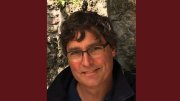Sean Kelly, Martignetti professor of philosophy, has been appointed dean of the division of arts and humanities within Harvard’s Faculty of Arts and Sciences, effective July 1. He succeeds Burden professor of photography Robin Kelsey, who has led the division since 2016.
FAS dean Hopi Hoekstra hailed Kelly’s “capacious and boundary-crossing scholarship” in a letter to the community announcing the appointment. She also noted that he has “taught and studied across all three FAS Divisions” and the School of Engineering and Applied Sciences, and that he was “the first philosopher at Harvard since William James to have had a psychology lab….”
Kelly has been heavily involved in the process of shaping undergraduate education and is “known for his deeply collaborative and inclusive leadership style,” said Hoekstra, “as well as his ability to build community around issues of genuine significance.” In 2013, he co-chaired the working group that was studying the nationwide decline in humanities enrollment. In 2015, he chaired Harvard’s General Education review committee that found that program lacking, and then led its overhaul later that year. He has also “cochaired the Harvard Humanities Project, which issued a report outlining a new vision for teaching the humanities at Harvard,” Hoekstra noted. “And, during the current Arts and Humanities strategic planning process, he chaired the Dean’s Study Group on Administrative Support, work that has guided new investment in support infrastructure for the Division.” He has also served on the committee that reviewed College policies on mental health and community policing, as well as the search for the new chief of the Harvard University Police Department. He currently chairs the FAS committee reviewing the request to de-name Winthrop House.
Kelly, who in 2021 was named a Harvard College professor (Harvard’s highest undergraduate teaching honor), is perhaps best known outside the University for his bestselling book, All Things Shining (his first for a lay audience), which he discussed with Harvard Magazine here.
In that interview, he made an argument for the importance of humanities education by telling a story about his wife’s 92-year-old grandmother:
[Her] education from the age of seven consisted primarily of memorizing enormous quantities of classical Chinese literature and philosophy—500 lines of poetry a day as she grew older.
“At a certain point she asked her mother, ‘Why do I have to do this? These poems don’t mean anything to me,’” Kelly relates. “And her mother said to her, ‘It is true they don’t mean anything to you now. But someday, an event will occur in your life and the moment it occurs, a line of poetry will pop into your head, totally unbidden. And the event will make sense in terms of the line of poetry and the line of poetry will make sense in terms of the event, and in that way, the meaning of your life will be tied up with the history of your entire culture. You will become a person who lives on the shoulders of the great culture that you have been brought up in.’”
Kelly said at the time that he believes everyone has “the ability to cultivate in ourselves the skills required to let us be grabbed by distinctions of meaning and worth” in the same way. Individuals have to work hard to become open to such revelatory moments, to learn to see and respond to the world in the context of cultural history. But humans “are the kind of being that has the capacity to bring ourselves and everything around us out at its best.”









